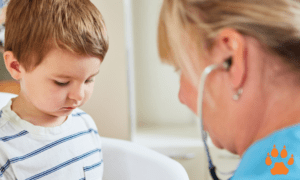By: Dr. Veja Tillman, DVM
Pets’ lives are disrupted during a natural disaster just as much as our own. They can experience fear, anxiety and stress which may cause them to display abnormal behaviors and develop short term health problems. Here are a few conditions and behaviors that you may notice from your pets after a hurricane.
Pets can experience stress and anxiety during and after a disaster. These may cause your pet(s) to develop signs of gastrointestinal upset. This may appear as decreased appetite, vomiting and/or diarrhea. In some pets this will last only a brief period (24 hours). However, some pets will continue to show signs for longer periods and the signs may worsen and require hospitalization and advanced treatments. Should your pet show any signs of gastrointestinal upset contact your veterinarian immediately (at the first occurrence of signs) for recommendations for treatment and care for your pet.
Stress and anxiety may also cause your pet to react in unusual ways, such as spraying urine or urinating in the home, hiding, defecating on floors and outside of litter boxes, excessive licking/grooming, aggression, vocalizing or destructive behavior. These can be normal behaviors after a traumatic event. However, these behaviors may be signs of or lead to other problems for your pet such as hair loss, skin infections and ingestion of foreign material leading to an intestinal blockage. If you become concerned about your pet’s behavior, seek advice from your veterinarian.
Animals are naturally curious and could get injured if they are brought back to a damaged home. Keep pets safe by avoiding walks in areas that contain storm debris. Do not walk your pet through or allow your pet to swim in flooded areas. Do not allow your pet to drink or ingest flood water or run off. These may contain toxins or bacteria or even wild animals that may cause harm to your pet or cause your pet to become very ill and require additional unexpected veterinary expenses.
Do not allow your pet to climb over debris piles. Debris may contain sharp objects that may cause injury to your pet which may result in a visit to the local emergency hospital for treatment. If possible, try to leave pets with a family member, friend, veterinarian or boarding facility while you are cleaning up your home. This will help to keep your pet safe and out of harms way until the home is safe for them to return.
A scared animal may react by biting or scratching. Handle your pet(s) carefully and calmly. Use favorite toys, blankets or favorite human’s unsoiled clothing to comfort pets while they are away from home.
When your pet(s) return to the home, try and comfort them. Speak calmly and take some time out to play with them. Give them lots of hugs and extra pettings and attention to reassure them that the storm has passed, and everything is ok. Doing so can help you in your recovery, as well.
ABOUT DR. VEJA TILLMAN, DVM
Dr. Tillman is a 2002 graduate of Tuskegee University School of Veterinary Medicine. Her veterinary practice and work experience focuses on pet health and wellness. She is the owner of Just 4 Pets Wellness Center and can be reached at 239-270-5721.








